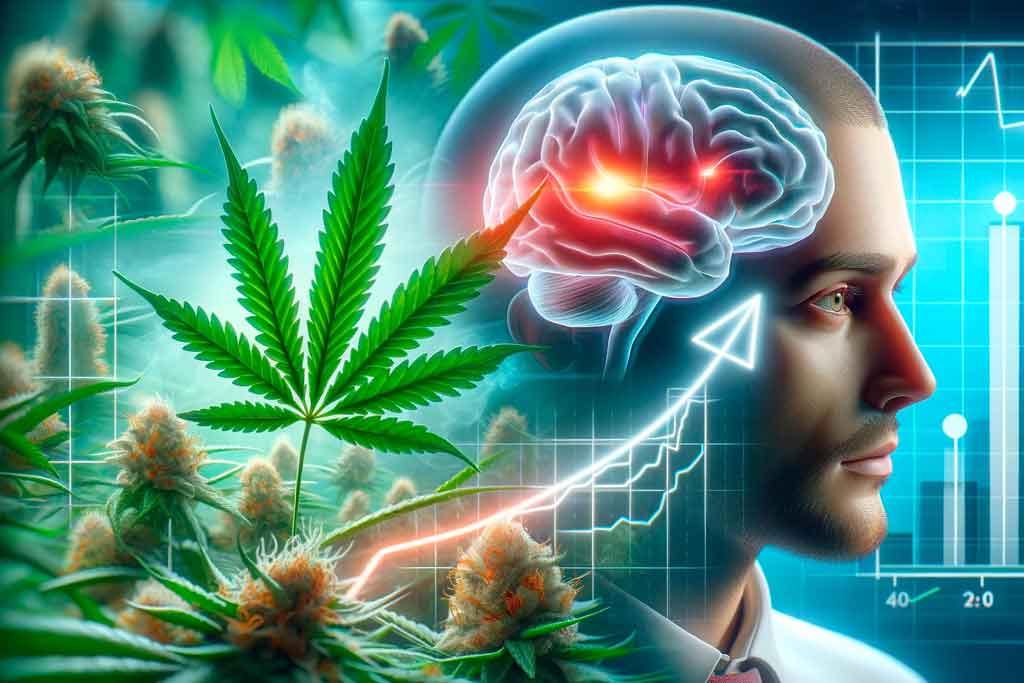

Cannabis has become one of the most widely used recreational drugs across the world. Its legalization in various regions and the increasing acceptance of its medicinal properties have contributed to a surge in consumption. While cannabis has been shown to offer therapeutic benefits for a range of conditions, concerns about its potential for harm, especially with heavy and prolonged use, have emerged. One of the most significant worries surrounding cannabis use is its potential role in triggering or exacerbating mental health disorders. This article explores the connection between heavy cannabis use and mental illness, examining the evidence, risk factors, and potential mechanisms by which cannabis may act as a catalyst for mental health issues.
The Growing Popularity of Cannabis and Its Mental Health Implications
The rise in cannabis use can be attributed to a variety of factors, including its increasing availability, cultural normalization, and medical use in certain jurisdictions. Despite the growing acceptance of cannabis, it is important to recognize that cannabis is not a benign substance. While moderate use may not necessarily result in significant adverse effects for many individuals, heavy use, especially in adolescents and young adults, can have a profound impact on mental health.
The question of whether heavy cannabis use can cause or contribute to mental illness is not a simple one, as it involves the interplay of various factors such as genetics, environment, age of first use, and frequency of consumption. Cannabis use can lead to both short-term and long-term changes in the brain, and in some cases, these changes may increase the risk of developing mental health issues. Research has suggested that cannabis, especially in large quantities, may act as a catalyst for a range of psychiatric disorders, including anxiety, depression, psychosis, and schizophrenia.
The Mechanisms of Cannabis and the Brain
To understand how cannabis use may influence mental health, it is important to examine the way cannabis interacts with the brain. The active compounds in cannabis, primarily tetrahydrocannabinol (THC) and cannabidiol (CBD), bind to cannabinoid receptors in the brain, particularly the CB1 receptors. These receptors are part of the endocannabinoid system, which is involved in regulating a wide range of physiological processes, including mood, memory, and perception.
THC, the psychoactive component of cannabis, is responsible for the drug’s intoxicating effects. It alters neurotransmitter release, which can lead to changes in cognition, perception, and behavior. At moderate levels, these effects may be temporary and reversible. However, with heavy and prolonged use, THC can cause more significant and lasting alterations in brain function. The brain’s reward system, responsible for regulating pleasure and motivation, can be disrupted, leading to mood disturbances and an increased risk of developing mental health issues.
Cannabis and Anxiety Disorders
One of the most common mental health issues associated with heavy cannabis use is anxiety. Cannabis use has a dual effect on anxiety; while some individuals use cannabis to alleviate symptoms of anxiety in the short term, chronic and heavy use can lead to the development or exacerbation of anxiety disorders. There are several ways in which cannabis use can contribute to anxiety:
1.Acute Anxiety or Paranoia: In some individuals, particularly those who are not regular users or those who consume large amounts of cannabis, THC can induce feelings of paranoia, nervousness, and heightened anxiety. These effects are typically temporary, but for some, they can trigger or worsen underlying anxiety disorders.
2.Chronic Anxiety: Prolonged cannabis use can lead to persistent changes in the brain’s chemistry, particularly in areas involved in regulating stress and anxiety. Chronic cannabis users may experience increased levels of baseline anxiety even when not under the influence of the drug. This may be related to the impact of cannabis on the brain’s ability to regulate the production of cortisol, a hormone associated with stress.
3.Cannabis-Induced Anxiety Disorders: For some individuals, heavy cannabis use can lead to the development of anxiety disorders such as generalized anxiety disorder (GAD) or panic disorder. In these cases, cannabis use may serve as a catalyst for the onset of these conditions, especially when combined with other risk factors like genetics or pre-existing mental health issues.
Cannabis and Depression
Depression is another mental health disorder that has been linked to heavy cannabis use. The relationship between cannabis use and depression is complex and bidirectional. While cannabis may provide temporary relief from depressive symptoms, chronic use can increase the risk of developing depression, particularly among vulnerable individuals. There are several ways in which heavy cannabis use can contribute to depression:
1.Dopamine Dysregulation: Cannabis use, especially in high doses, can disrupt the brain’s reward system, which is regulated by dopamine. Dopamine is a neurotransmitter involved in mood regulation, motivation, and pleasure. Chronic cannabis use can lead to a reduction in dopamine receptors, which can result in feelings of anhedonia (inability to experience pleasure) and a reduced capacity for motivation. These changes in brain chemistry may contribute to the development of depressive symptoms.
2.Increased Risk of Depression in Adolescence: Research has shown that individuals who begin using cannabis during adolescence, when the brain is still developing, are at a higher risk of developing depression later in life. Early cannabis use can interfere with the normal maturation of brain areas involved in mood regulation, making individuals more vulnerable to mood disorders.
3.Self-Medication: Many individuals with depression may turn to cannabis as a form of self-medication. While cannabis may provide temporary relief from depressive symptoms, its long-term use can exacerbate the condition and lead to a cycle of dependence, where individuals use cannabis to cope with their depression, further impairing their mental health.
Cannabis and Psychosis
Perhaps the most concerning mental health risk associated with heavy cannabis use is the potential for cannabis-induced psychosis or the triggering of psychotic disorders such as schizophrenia. The link between cannabis and psychosis is well-established, particularly in individuals with a predisposition to psychotic disorders. The relationship between cannabis use and psychosis is complex, but several mechanisms may explain this connection:
1.The Role of THC: THC has been shown to induce psychotic-like symptoms in certain individuals, particularly those who are genetically predisposed to mental health disorders. High doses of THC can trigger hallucinations, delusions, and disorganized thinking, which are hallmark symptoms of psychosis. In some cases, these symptoms may subside once the effects of the drug wear off. However, for individuals with an underlying vulnerability to psychosis, cannabis use may precipitate the onset of a psychotic episode.
2.Genetic Predisposition: Research suggests that individuals with a family history of schizophrenia or other psychotic disorders are at a higher risk of developing psychosis as a result of cannabis use. Cannabis use may act as a trigger for the onset of psychotic symptoms, particularly in those who are already genetically predisposed to these conditions.
3.Long-Term Effects: Chronic cannabis use, especially during adolescence, has been associated with an increased risk of developing schizophrenia. Studies have shown that individuals who use cannabis regularly during their teenage years are more likely to experience the onset of schizophrenia or other psychotic disorders in adulthood. The earlier the onset of cannabis use, the greater the risk of developing long-term mental health issues.
Cannabis and Cognitive Function
Heavy cannabis use can also have a significant impact on cognitive function. Cognitive impairments associated with long-term cannabis use include difficulties with memory, attention, learning, and decision-making. These cognitive deficits can contribute to the development of mental health issues, as individuals may struggle to cope with daily demands and stressors. Furthermore, cannabis-induced cognitive impairments may exacerbate pre-existing mental health conditions, leading to a cycle of worsening symptoms.
Conclusion
Heavy cannabis use has the potential to be a catalyst for a variety of mental health disorders, including anxiety, depression, psychosis, and cognitive impairments. The relationship between cannabis and mental illness is complex and multifaceted, with individual factors such as genetics, age of onset, and frequency of use playing a significant role in determining the risk of developing mental health issues. While cannabis may offer short-term relief for some individuals, its long-term use can have serious consequences for mental health, particularly in vulnerable populations.
As cannabis use continues to rise, it is essential to raise awareness of the potential mental health risks associated with heavy and prolonged consumption. Public health campaigns should focus on educating individuals, particularly adolescents and young adults, about the risks of heavy cannabis use and the potential for mental illness. Additionally, policymakers should consider the mental health implications of cannabis legalization and work to implement regulations that prioritize the well-being of individuals, particularly those who may be at an increased risk of developing mental health disorders.
Ultimately, while cannabis may have therapeutic benefits for some individuals, its heavy use can be a catalyst for mental illness in others. As more research is conducted into the long-term effects of cannabis, it is important to strike a balance between its potential benefits and the risks it poses to mental health.
